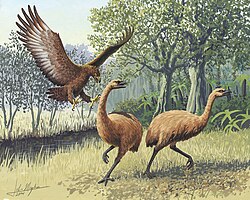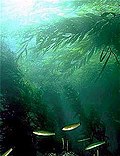Over-harvesting
Over-harvesting means taking more from the land (or sea) than it can replace. It includes extreme farming, grazing, fishing, and using fresh water.
Over-harvesting is harmful in the long term. Forests or wetlands are hard to replace. Damage to nature hurts animals and humans. Most wetlands are damaged by overuse as a source of drinking water, and are sometimes drained to make farmland or land for building. A thriving and diverse ecosystem is destroyed.
Over-harvesting also applies to animals. Population numbers may drop as a result, and species may become extinct. Overfishing is a typical example. Nowadays, you can only fish, shoot deer or birds at certain times of the year. The season when they mate, reproduce and lay eggs or have the young are protected. Areas of especial natural beauty or scientific interest are also protected. Now, in the United Kingdom, it is illegal to take bird eggs.
One thing which acts against conservation is the overpopulation of the world. The greatest single reason why the world loses forests is that some people want the land for other purposes. A few people gain, but everyone shares the cost. This is called the tragedy of the commons.
Over-harvesting Media
When the giant flightless birds called moa were overexploited to the point of extinction, the giant Haast's eagle that preyed on them also became extinct.
Cows on Selsley Common. The tragedy of the commons is a useful parable for understanding how overexploitation can occur.
The Atlantic bluefin tuna is currently overexploited. Scientists say 7,500 tons annually is the sustainable limit, yet the fishing industry continue to harvest 60,000 tons.
The rich diversity of marine life inhabiting coral reefs attracts bioprospectors. Many coral reefs are overexploited; threats include coral mining, cyanide and blast fishing, and overfishing in general.
It is not just humans that overexploit resources. Overgrazing can be caused by native fauna, as shown in the upper right. However, past human overexploitation (leading to elimination of some predators) may be behind the situation.
The Carolina parakeet was hunted to extinction.
Overexploiting sea otters resulted in cascade effects which destroyed kelp forest ecosystems.
References
- ↑ Frank, Kenneth T. et al 2005. (2005). "Trophic cascades in a formerly cod-dominated ecosystem". Science. 308 (5728): 1621–1623. Bibcode:2005Sci...308.1621F. doi:10.1126/science.1113075. PMID 15947186. S2CID 45088691.








